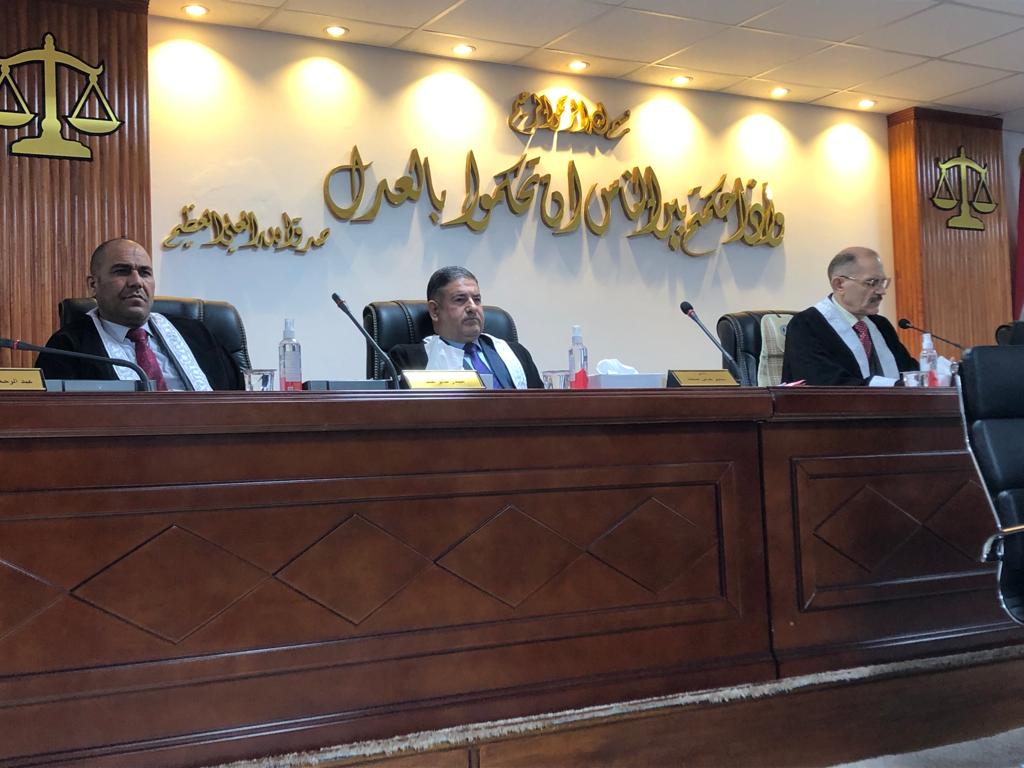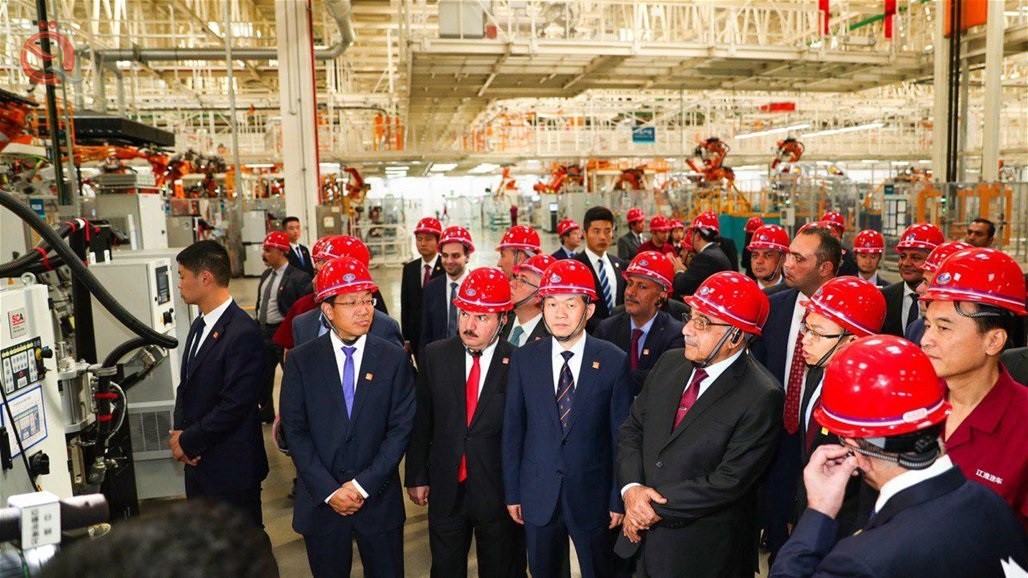Iraqi News Catch Up From Jan 18th to 21st 2022
The Federal Court adjourned the hearing for the election of the Presidency of Parliament until the 25th
link

The Federal Supreme Court, the highest judicial authority in Iraq, announced on Wednesday the postponement of the plea to challenge the constitutionality of the first parliament session until next Tuesday, 25 January.
Shafaq News Agency's reporter, who attended the appeal hearing on two lawsuits regarding the constitutionality of the first session of the Iraqi parliament in its fifth session, said that the Federal Court was satisfied with taking the statements of both parties.
On January 13, the Federal Supreme Court issued a decision to temporarily suspend the work of the Presidency of the Iraqi Council of Representatives, after two lawsuits filed by independent MP Basem Khashan and Representative Mahmoud Dawoud Salman regarding the first session and the similar violations of the constitution and the internal system of the Council.
The court decided, according to its ruling, to suspend the work of the Presidency of the House of Representatives elected in the first session of the House of Representatives held on January 9, 2022, temporarily, until the two cases are resolved.
Iraq is moving again.. the battle to liberate the economy from the dominance of oil
Iraq is suffering the scourge of oil fluctuations that have affected its present and the future of its generations, and they are what prompted it to move again in the context of getting rid of the rentier oil economy.
The country has been suffering for nearly two decades from the extinction and decline of the private sector and the absence of national industry, which opened the door wide for foreign importers.
Last year, the government of Prime Minister Mustafa Al-Kazemi announced the preparation of a package of new laws aimed at developing the work of the private sector to be a major backbone in the field of poverty and unemployment reduction strategy in the country and the public sector's participation in the responsibility.
Although Iraq owns about 227 factories and laboratories belonging to the public sector companies in Iraq, the number of workers in them does not exceed 140 people only, according to the data of the Ministry of Industry and Minerals.
Until 2003, the private sector constituted about 23% of the gross domestic product in Iraq, but the chaos of planning and the absence of strategies after that date pushed the country to be the largest consumer of imported goods.
Minister of Planning Khaled Al-Battal, while chairing the fourth session of the Private Sector Development Council, yesterday, Wednesday, according to an official statement, stressed that the ministry is working very seriously in order to overcome all difficulties and challenges facing the transformation process and empower this vital sector, by identifying and diagnosing problems and then setting up The solutions and treatments required for them, noting that "one of the problems is the presence of an intersection in the relationship between the industrial and commercial sectors, and this calls for integration between them."
Al-Battal added, "There is a great need for an effective development banking sector, capable of preparing the fertile investment ground for the private sector, and enabling it to implement government development policies.
He pointed out that "the ministry needs bold and courageous decisions that contribute to the development of the private sector, calling on" representatives of this sector to determine what is required of the government to sponsor this sector.
Al-Battal indicated that one of the paths to developing the private sector is to develop a transitional plan for buying and selling goods and services provided by public companies, with an assessment of the viability of these companies or not, and categorizing them into successful, stumbling and failing, and activating the procedures for restructuring them and transforming them into companies operating with commercial approaches.
The President of the Republic, Barham Salih, had warned more than once against the consequences of relying on oil as an orphan resource in consolidating the national income, as a result of the technological changes taking place in the world that push for the entry of alternative energy and the weak global demand for black wealth during the next two decades.
And Iraq entered the middle of 2020, a stifling financial crisis that forced it to borrow more than once to secure the salaries of state employees, as a result of the drop in oil prices and the global closure conditions imposed by the repercussions of the Corona pandemic.
For his part, the economic advisor to the Prime Minister, Mazhar Muhammad Salih, stresses the need to support and finance the private sector to contribute to the growth of the Iraqi economy.
In an interview with Al-Ain News, Saleh asserts, "The current government has taken important and effective steps in moving the private sector file, which has suffered neglect and decline over the past years.
Salih points out that "revitalizing the private sector in Iraq will contribute to solving many aggravating problems, including the housing crisis and unemployment rates, as well as poverty levels, in addition to the addition it achieves in moving the country out of the quagmire of the rentier economy."
In turn, the economic expert Ali Al-Karkhi says, "Activating the private sector starts with enacting legislation and laws to protect the local product and limiting foreign imports to necessary goods and commodities that cannot be produced at home, as well as supporting industrial projects and technical workshops with soft loans that push them towards studied production and index." as needed.”
Al-Karkhi points out that the most important step in this matter is to provide a safe and suitable environment for investment and capital, including tightening control over the outlets and the parties that follow extortion with them and try to adapt these projects for the benefit of them at the expense of quality and the public interest.
Mawazine News Foundation honors the Governor of the Central Bank
Governor of the Central Bank of Iraq, Mustafa Ghaleb, received a delegation from (Mawazine Foundation for Artistic and Media Production) and talked about the sixth session of the annual Mawazine Festival.
And also about giving to the Central Bank of Iraq and its management in supporting various cultural, media and development activities.
The governor received a certificate of appreciation under the title (Mawazine Prize for Creativity and Excellence 2021).
Today, Thursday, the Mawazine News Foundation honored the Governor of the Central Bank, Mustafa Ghaleb Mokhief, in appreciation of his efforts, performance and giving during the past year
Saleh calls for supporting the private sector to contribute to the growth of the economy
Mazhar Muhammad Salih, the economic advisor to the Prime Minister, called for supporting and financing the private sector to contribute to the growth of the Iraqi economy.
Salih said that redirecting government funding to meet the needs of the private sector is an important necessity, and the interest in the private sector and its government financing with soft loans as the Central Bank of Iraq's exceptional initiative in affordable housing financing for the private sector, which amounted to three trillion dinars, stimulated and will stimulate the overall housing activity
Al-Maliki is out of the box ... A deputy reveals an upcoming alliance between Al-Amiri and Al-Sadr - Urgent\\\\
Today, Wednesday, Representative Yasser Iskandar and Tut revealed an upcoming alliance with the Sadrist movement that will be announced by the leader of the Fatah Alliance Hadi al-Amiri. This alliance will stipulate a rapprochement between al-Sadr and al-Amiri, while al-Maliki will be 90% outside this framework.
Watout told (Baghdad Today) that "Al-Maliki's presence outside the Shiite house is negative, and it is due to the dispute with Al-Sadr."
He expected "the Federal Court to postpone its decision on the legality or illegality of the first session of Parliament, as there is political pressure that may contribute to the postponement."
He explained, "Political pressure is present on the court at a time when it is taking into account balance and the issue of reaching a political agreement."
Economy News publishes the Iraqi-Chinese agreement

Al-Eqtisadiah News publishes the terms of the Chinese-Iraqi agreement signed by the former Iraqi government headed by Adel Abdul-Mahdi.
It is in English To view the terms of the agreement, click here
Iraq turns its financial surplus into treasuries.. Iraq's possession of US bonds rises by about 20% within 3 months
Iraq is still continuing to buy US bonds, as well as enhancing its reserves of hard currency in conjunction with the rise in oil prices and the increase in the unplanned surplus in the budget of revenues. Iraq’s possession of US bonds rose last November by 5% compared to October, which also witnessed An increase of 13% in the month of October.
And the US Treasury announced that Iraq's possession of US bonds increased by nearly one billion dollars during the month of last November, to exceed 21 billion dollars.
The Treasury said in its table that "Iraq's possession of US Treasury bonds for the month of November increased by 874 million dollars, or 4.29%, to reach 21.238 billion dollars, after it was 20.364 billion dollars in the month of October," indicating that "these bonds also increased from the month Same from last year 2020, when Iraq's holdings of bonds amounted to $19.8 billion.
And she added, "Iraqi bonds, including long-term guarantees amounting to 9.088 billion dollars and short-term guarantees amounting to 12.150 billion dollars," noting that these bonds represent 0.3% of the world's bonds.
In the Arab world, Saudi Arabia comes at the forefront of the most possessing countries, with an amount of 115.2 billion dollars, followed by the UAE with 48.83 billion dollars, Kuwait third with 45 billion dollars, then Iraq fourth, Oman fifth with 5.4 billion dollars, then Morocco with 3.7 billion dollars.
She pointed out that "the most countries in possession of US bonds are Japan, with an amount of 1.340 trillion dollars, followed by China, with a rate of 1.080 trillion dollars, followed by Britain, with a rate of 621 billion dollars, and then Luxembourg with 334 billion dollars."
Returning to last October, the US Treasury said that “Iraq’s possession of US Treasury bonds for the month of October increased by 2.410 billion dollars, or 13.55%, to reach 20.364 billion dollars, after it was 17.954 billion dollars in the month of September.”
Indicating that "these bonds decreased from the same month of last year 2020, when Iraq's possession of bonds amounted to 21.6 billion dollars."
And she added, "Iraqi bonds, including long-term guarantees amounting to 9.028 billion dollars and short-term guarantees amounting to 11.336 billion dollars," noting that these bonds represent 0.2% of the world's bonds.
In the Arab world, Saudi Arabia is at the forefront of the most possessing countries, with an amount of 116.4 billion dollars, followed by the UAE with 53 billion dollars, Kuwait third with 45.9 billion dollars, then Iraq fourth, Oman fifth with 5 billion dollars, then Morocco with 3.7 billion dollars.
She pointed out that "the most countries in possession of US bonds are Japan, with a value of 1.320 trillion dollars, followed by China, with a rate of 1.065 trillion dollars, followed by Britain, with a rate of 579 billion dollars."
No comments:
Post a Comment